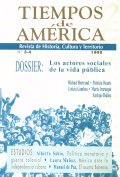Under development and working-class movement. A reflection on the limits of the Bolivian socialism (1940-1964)
Article Sidebar

Main Article Content
Enrique Ibáñez Rojo
The paper inquires on the roots of the striking working-class centrality in the contemporary history of the poorest country of South America, and tries to show the determinants of the main organizational feature of the Bolivian labour movement: its revolutionary radicalism. It argues that the sustained power of the old Bolivian labour movement was mainly a result of the reproduction of an economic structure frozen in the traditional mining-exports mould and particularly underdeveloped. That this economic reality made Bolivian labour movement a miner’s movement. And that it is the rational learning of the miner’s communities, as they experienced the limits of Bolivian political reformism, which determined its main organizational features, and especially its revolutionary radicalism. So, it is argued, the huge presence of socialism in the Bolivian political scene was the limited product of a long historical cycle dominated by the big tin mines, and signed by extreme poverty and economic stagnation.
Article Details
How to Cite
Ibáñez Rojo, Enrique. “Under development and working-class movement. A reflection on the limits of the Bolivian socialism (1940-1964)”. Tiempos de América: revista de historia, cultura y territorio, no. 3, pp. 119-36, https://raco.cat/index.php/TiemposAmerica/article/view/105049.